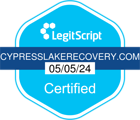Art & Music Therapy
Integrative therapies are becoming widely used in addiction recovery and at Cypress Lake Recovery, we incorporate music and art therapy to help our patients open up to addiction treatment and recovery. In a study done by the National Institute of Health, only about 36.8% of recovery programs for drugs and alcohol abuse use art therapy, and only 14.7% use music therapy separately; combined use of these treatments are implemented about 12% of the time in addiction recovery. Based on the evidence from various studies and our experiences incorporating these integrative therapies, we believe music and art therapy are of great importance to our patients and an inherent part of our mind, body and spirit holistic-care approach.

Addiction Reduces Social Skills, Emotional Expression, and the Mind-Body Connection
We treat various addictions from alcohol, substance abuse and prescription drugs. Regardless of the addiction type, whether it’s a mind altering substance or behavior, the same thread connects them all. Addiction and dependency reduce our social skills significantly since we tend to pull away from our friends and family to focus on our drug or behavior and surround ourselves with opportunities to use. When we cut off our communication with friends and family, we forget how to interact with people. Addiction keeps the individual singularly-minded on one goal: to get their fix. These behaviors don’t usually involve anyone else but that person affected by addiction which means they’re continually left with their own thoughts – addictive thoughts.
In addiction treatment, we look to bring our patients back to square one with social interactions and get them talking to their peers. In therapy, we learn about the addictive mindset and how to recognize that within ourselves in comparison to a healthy way of thinking. Once we work with patients to reintegrate them into social situations, we can then work on their emotional expression, which goes hand in hand with social skills.
The more isolated we are, the more likely we are to forget how to behave appropriately or what type of emotional and social expressions are acceptable. Here we focus on recognizing how we deal with others and how to understand the best ways to communicate our feelings with them.
When we are affected by addiction, isolation and depression take over so that we feel hopeless and completely alone. This leaves our patients emotionally blocked because they feel as though this separation is real when their addiction is what creates this feeling, not reality. Our blocked emotions create a barrage of internal criticism because we bottle our feelings; this bottling of emotions isn’t healthy for anyone, especially someone suffering from addiction. As we become more and more hypercritical of ourselves, we lose all thought about the essential things we need in life to be healthy and happy. Instead, we focus on the negative side of our lives and forget those things, which fuels our dependency on drugs and alcohol to numb the mind. The mind-body connection is completely severed so that health is no longer a concern.
Contact Our Admissions Team Today

Art and Music Therapy
Testimonials
![]()
![]()
![]()
![]()
![]()
Regina
I am so happy that I chose Sabino to begin my recovery. I have suffered for years from depression, anxiety, panic disorder, and PTSD. The programs that are offered here at Sabino have been truly phenomenal in helping me recover. I also appreciated the professional staff that are here on duty 24/7, which helps create a safe environment. Cypress Lake Recovery uses effective “one on one” methods that meet each person’s individual needs because they evaluate and have a better understanding of your personal traumatic experiences. Thanks Sabino, I am truly grateful to you and the Sabino family.
![]()
![]()
![]()
![]()
![]()
J.A.
A beautiful facility! Staff sets the tone and kindness that residents easily follow. Thank you, Cypress Lake Recovery!
![]()
![]()
![]()
![]()
![]()
Pamela
The program at Cypress Lake Recovery works! I emerged from an accumulation of unrecognized emotions, issues of trust, and unresolved grief and loss. 35-days of effective integration of customized quality therapy reconnected my mind, body, spirit, and I am worth it! I had masked emotions and hurtful events for decades with alcohol. At Cypress Lake Recovery I safely focused deep within to unleash harmful secrets and self-degradation. Tools of recovery were practiced, not just presented. Integrative therapies were tailored to my circumstances, thus were effective. This residential program is like no other. For me, Cypress Lake Recovery delivered what was professed. I am forever grateful for this gift of healing.
![]()
![]()
![]()
![]()
![]()
Mike
Life changing experience. Wonderful staff. Wonderful program. Thanks for everything!
![]()
![]()
![]()
![]()
![]()
Darcy
It was great to begin my recovery in a group environment with so many knowledgeable nurses, therapists, BHT’s, and others around for support. The equine therapy, challenge course, family week, and daily therapies all work together seamlessly, allowing me to leave Sabino as a healthier and stronger person!
How does art therapy work in addiction treatment?
Art therapy is shown to work well with trauma victims and those suffering from addiction. Learning to work with our hands and create things that can display what we are unable to is the first step when we deal with internal conflict. Traditional talk therapy and 12-step programs may work in conjunction with art therapy because once we’ve allowed our patient to show us what they’re struggling with, we can work with them to analyze what we see as clinicians. During this process of creating art, we can involve our patients in the process so that we can help them understand what we need to work on as a team.
As we work in this creative space with art therapy and work with our hands, we relieve stress, anxiety and any other emotions locked away. Art therapy also allows patients to leave their overactive minds and focus on the task at hand to create something. This is the practice of mindfulness, which is an active form of meditation. Art therapy provides an outlet for stimulation of the mind, and we can work with the 12-step program by creating art to explain and process each step. Much of the groundwork for our one-on-one counseling sessions is found here in art therapy.
Art therapy activities include:
- Painting
- Drawing
- Creating sculptures
- Paper mache
- Pottery
Nationally Recognized & Accredited




How does music therapy work in recovery?
Art therapy allows us to work with our hands in their own ways, which helps our patients open up to treatment. Music therapy is the next step and involves incorporating written lyrics with original music that works with coping skills and builds confidence within our patients. Learning a new skill such as playing music or understanding the musical process removes the addictive mind from critical thinking. We instead teach our patients to look deeper into the core of their need for addiction and provide a self-analysis through musical expression.
The field of music therapy to heal the body and soul has been actively used in medicine for years and has proven psychological healing properties. Our patients with depression and anxiety find music therapy to be one of the most relaxing treatments that prove to them tenfold that they don’t need substances to find this relaxation and calm.
Music therapy includes:
- Writing music
- Playing music
- Listening to music
- Creating lyrics
- Analyzing lyrics
- Teaching music to your peers
- Singing



